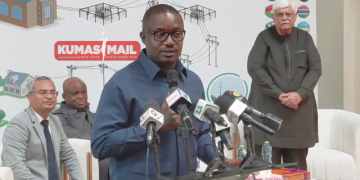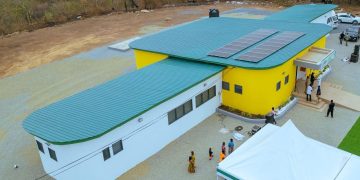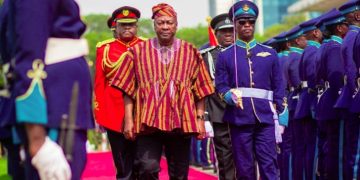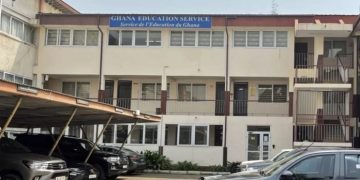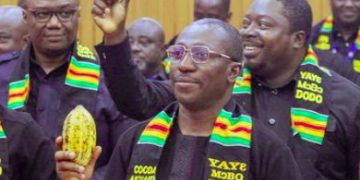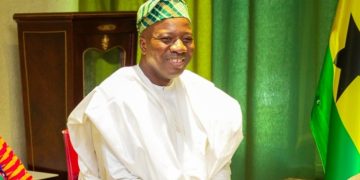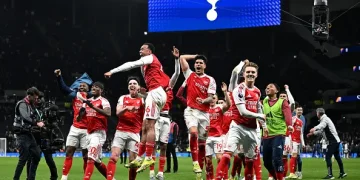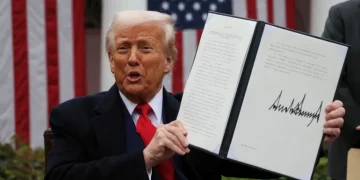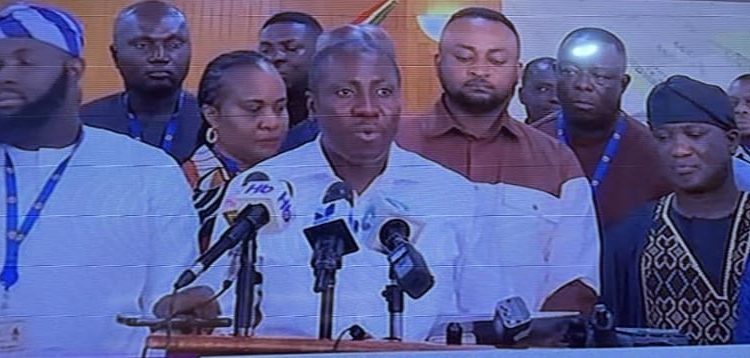The Minority Caucus in Parliament has sharply criticised the government’s 2026 Budget Statement and Economic Policy, describing it as hollow, unambitious and disconnected from the economic realities facing Ghanaians.
Addressing journalists in Parliament on Thursday, the Minority said the second budget of the NDC administration fails to provide any meaningful direction for economic recovery, accusing the government of relying on “empty slogans, recycled initiatives, and deceptive fiscal reporting.”
Minority Spokesperson on Finance, Dr. Richard Acheampong, who delivered the statement on behalf of the caucus, said the government has “chosen propaganda over policy” and is presiding over an economy that “looks stable on paper but feels stagnant to citizens and businesses.”
The Minority argued that the budget’s theme—“Resetting for Growth, Jobs and Economic Transformation”—contradicts the actual numbers contained in the policy document.
They accused the government of riding on macroeconomic gains achieved under the previous NPP administration, particularly progress under the IMF programme negotiated in 2023.
They said the touted return to single-digit inflation, improved reserves and rising non-oil GDP growth were expected outcomes of earlier reforms, not the result of new NDC policies.
A major point of contention was what the caucus described as the government’s systematic failure to release funds for approved capital and goods-and-services expenditure.
The statement cited data showing:
- Only 56% of allocated goods and services spending had been released by the end of the third quarter.
- Just 34% of capital expenditure had been disbursed between January and September, despite Parliament’s approval of far higher allocations.
The Minority argued that the government is deliberately under-executing growth-enhancing spending in order to create “artificial savings” and paint a picture of fiscal discipline.
“This is not prudence; it is fiscal deception,” the statement said, accusing Finance Minister Dr. Cassiel Ato Forson of “weaponising underspending” to mask revenue failures and cash-flow pressures.
The caucus dismissed two of the government’s flagship programmes—the 24-Hour Economy and the Big Push infrastructure agenda—as underfunded and lacking credible implementation plans.
The Minority noted that although government previously announced that the 24-Hour Economy would create a 1-3-3 job model, the 2026 Budget allocates only GH¢90 million to the initiative, describing the amount as “tokenistic” and inadequate to support nationwide job creation.
They also questioned the claim that GH¢63 billion worth of road contracts had been awarded under the Big Push programme.
According to the Minority, the numbers do not add up, and if true, would amount to a violation of the Public Financial Management Act.
Citing data from the budget, the Minority pointed to significant revenue gaps in 2025:
- GH¢7.7 billion shortfall in total revenue and grants
- GH¢6.8 billion gap in domestic revenue
- GH¢9 billion shortfall in tax revenue
They argued that the government failed to admit to these challenges in the budget presentation and warned that the 2026 revenue targets are overly optimistic.
The caucus predicted the possibility of new mid-year taxes, further cuts to capital projects, or more arrears accumulation if the projections fail—just as occurred in 2025.
The Minority raised concerns about investor sentiment, claiming that 55% of government securities auctions in 2025 ended in failure.
They described this trend as a clear signal that investors lack confidence in the government’s fiscal management, adding that persistent auction shortfalls have forced government into expensive short-term borrowing.
They also criticised the Bank of Ghana’s foreign exchange interventions, alleging that more than US$8 billion has been spent defending the cedi since January.
According to them, the currency’s performance is being artificially propped up by reserves built by the previous NPP administration.
The group accused the government of denying public-sector workers meaningful wage recovery.
They noted that after inflation eroded real incomes in 2025, the announced 9% salary increase for 2026 is “an insult” to workers.
They argued that while inflation has moderated, the prices of essential goods remain high, leaving households under severe pressure.
The Minority rejected the government’s claim that Ghana’s debt sustainability has improved under the NDC, arguing that the bulk of debt restructuring—Eurobonds, domestic debt and bilateral relief—was achieved before the change of government.
They said the administration has merely inherited the gains secured by the previous NPP government.
The caucus also criticised the government for repeating VAT reforms announced in 2025 but never implemented, describing it as evidence of insincerity toward the business community.
They further accused the government of rebranding NPP initiatives—including the gold purchase programme and renegotiated power contracts—while achieving “inferior outcomes.”
The Minority concluded that the 2026 Budget lacks the ambition to drive growth or job creation, and described it as the “Galamsey Budget—Growthless, Jobless and Minimalist.”
They urged Ghanaians to demand accountability and reject what they say is a government relying on rhetoric rather than tangible economic progress.
Source: www.kumasimail.com




